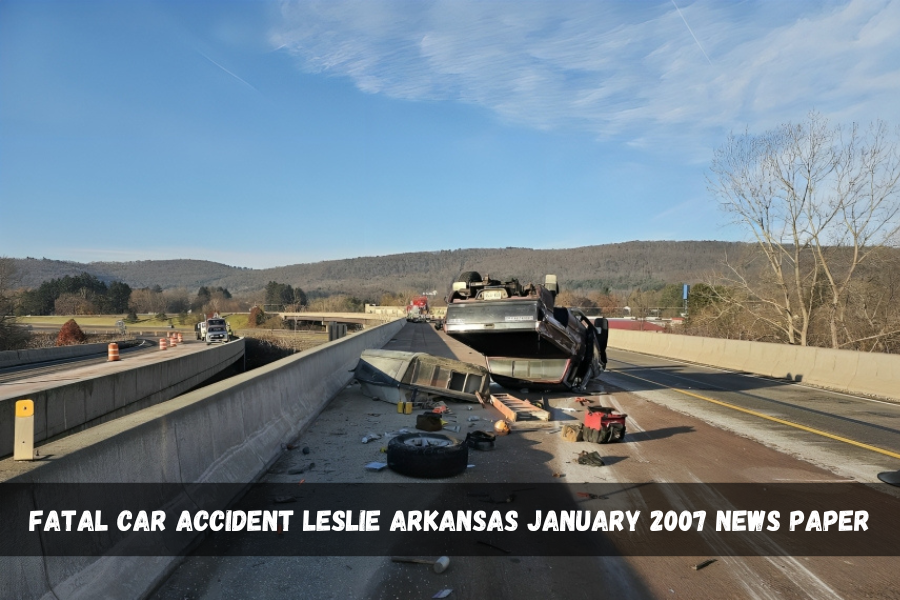Introduction
On January 15, 2007, the little town of Leslie, Arkansas, was until the end of time changed. Settled inside the quiet Ozark Mountains, this close-knit community of around 200 inhabitants confronted a annihilating catastrophe that sent shockwaves through the whole locale. Known for its rolling slopes and provincial charm, Leslie is a put where everybody knows each other by title. The lethal car mischance that happened on that cold January morning cleared out an permanent check, reminding inhabitants of the unusual threats of winter driving.
The Setting: A Calm Community in the Ozarks
Leslie, Arkansas, is more than fair a speck on the map—it’s a tight-knit town where neighbors see out for one another. With its little populace and beautiful scenes, Leslie encapsulates the pith of country life. Be that as it may, its wonderful environment too come with inalienable dangers, particularly amid the unforgiving winter months. January in the Ozarks frequently brings solidifying temperatures, frigid streets, and startling snowfall, making unsafe conditions for drivers. In spite of these challenges, inhabitants were usual to winter driving and by and large felt arranged for what lay ahead. However, the lethal car mischance in Leslie, Arkansas, in January 2007, demonstrated that nature’s unusualness can lead to unexpected tragedies.
The Mischance: A Day That Changed Everything
On the morning of January 15, 2007, a nearby tall school educator set out on a schedule drive along Thruway 65, went with by three travelers. The climate was unseasonably cold, and snow whirlwinds had cleared out the streets smooth with ice. As the vehicle traveled along the winding thruway, it hit a fix of dark ice, causing the driver to lose control. The car slid off the street and collided brutally with a tree. To begin with responders were called to the scene instantly, but the affect was serious. In spite of their best endeavors, two travelers, counting the cherished educator, appallingly misplaced their lives.
First Responders and Quick Aftermath
Local crisis administrations, counting the fire division, sheriff’s office, and therapeutic groups, arrived quickly. Leslie’s little clinic, not prepared for major injury cases, did its best to handle the circumstance. Shockingly, the wounds supported in the crash were as well extreme. The lethal car mishap in Leslie, Arkansas, that January morning underscored the constrained assets accessible in country communities and the basic require for moved forward framework and crisis services.
Investigating the Cause: Climate, Streets, and Vehicle Conditions
The Arkansas State Police conducted a careful examination into the mischance. Their discoveries pointed to a few contributing variables. Preeminent among them was the frosty street condition. Solidifying temperatures and untreated streets had made patches of dark ice, especially unsafe on the winding, uneven landscape of Thruway 65. The extend of street where the mishap happened was known for its challenging bends and constrained bear space, making it troublesome for drivers to recapture control once a slide began.
In expansion to the street conditions, examiners inspected the vehicle’s state. Whereas no mechanical disappointment was distinguished, concerns were raised approximately the car’s tires and generally upkeep. The driver, an experienced nearby educator, was known for her cautious approach to driving. It was clear she had taken safety measures, but the combination of components that morning demonstrated insurmountable.
The Community Reaction: Grieving and Reflection
The misfortune of the educator was a destroying blow to Leslie’s little community. She was more than fair an teacher; she was a coach, companion, and necessarily portion of the town’s texture. Her passing cleared out a void that was felt profoundly by her understudies, colleagues, and neighbors. The lethal car mischance in Leslie, Arkansas, on that cold January day got to be a energizing point for the community, inciting an overflowing of back for the victims’ families. Dedication administrations held at the neighborhood school brought the town together, advertising a space for collective grieving and healing.
Media Scope and Backing for Change
Local media secured the catastrophe broadly, sparkling a highlight on the broader issues of street security in provincial Arkansas. The deadly car mishap in Leslie, Arkansas, in January 2007, highlighted the require for way better framework and more assets for winter street upkeep. News reports emphasized the perils of dark ice and the challenges confronted by little towns with restricted budgets for street treatment. This scope started discussions at the state level, with a few agents calling for expanded financing for rustic highways.
Lessons Learned: Street Security and Community Initiatives
In the wake of the mischance, Leslie’s inhabitants and nearby specialists propelled a few street security campaigns. These activities pointed to teach drivers almost the significance of winter vehicle upkeep and the threats of frigid streets. Community workshops centered on recognizing dark ice, legitimate tire care, and secure driving hones in winter conditions.
The deadly car mishap in Leslie, Arkansas, moreover driven to viable changes. Moved forward signage along Interstate 65 presently cautions drivers of potential ice dangers, and there are continuous endeavors to secure financing for superior street support. The catastrophe got to be a catalyst for long-overdue changes, with the trust that such a misfortune would not be repeated.
Moving Forward: Recuperating and Legacy
Years after the deadly car mishap in Leslie, Arkansas, the town proceeds to feel its affect. For those who misplaced cherished ones, the pain remains, but so does the community’s flexibility. The memory of the cherished educator lives on in the hearts of her understudies and colleagues. Her bequest is one of commitment, benevolence, and an persevering update of the significance of street safety.
The mishap reshaped Leslie’s approach to winter driving. Inhabitants are presently more watchful, understanding that indeed the most schedule drive can turn perilous. The discussion approximately street security that started in the consequence of the crash has proceeded, driving to a more noteworthy mindfulness and proactive measures to ensure future generations.
Also Read : gamestop february october irwin decrypt
Conclusion
The deadly car mishap in Leslie, Arkansas, on January 15, 2007, was more than fair a appalling occasion; it was a wake-up call for a little town and past. It uncovered the vulnerabilities of rustic foundation, the eccentrics of winter streets, and the significant affect of misfortune on a tight-knit community. The catastrophe of that day serves as a effective update of the significance of watchfulness, readiness, and community support.
As Leslie proceeds to mend, the lessons learned from that cold January morning stay a directing constrain. The town’s reaction to the lethal car mischance has cultivated a recharged commitment to security, guaranteeing that the bequest of those misplaced is one of enduring positive change.
In recollecting the occasions of January 2007, Leslie, Arkansas, respects its past whereas endeavoring for a more secure future—a future where the difficult lessons learned proceed to spare lives.
FAQs
1. What happened during the fatal car accident in Leslie, Arkansas, in January 2007?
On January 15, 2007, a vehicle carrying four passengers skidded on black ice along Highway 65. The car lost control and crashed into a tree. Unfortunately, two of the passengers, including a beloved local teacher, did not survive the accident.
2. Where exactly did the accident occur?
The accident occurred on a winding stretch of Highway 65 near Leslie, a small town located in the Ozark Mountains. The icy road conditions, common during Arkansas winters, contributed significantly to the incident.
3. What were the primary causes of the accident?
The investigation identified several contributing factors, including black ice on the road, which made driving conditions extremely hazardous. The mountainous terrain and lack of road treatment at the time also played a role.
4. How did the local community respond to the tragedy?
The community came together to support the victims’ families and mourn the loss. Memorial services were held at the local school, and the incident prompted discussions about improving road safety and emergency response in rural areas.
5. What changes were made to improve road safety after the accident?
In the aftermath, Leslie and state officials increased efforts to enhance road safety. Improvements included better signage warning of ice hazards, community workshops on winter driving, and advocacy for more state funding to maintain rural roads during winter.
6. Were there any legal consequences or lawsuits following the accident?
There was no significant litigation reported. The focus remained on community support and addressing the broader issue of road safety in rural areas rather than individual accountability.
7. How did the accident impact the families involved?
The families faced profound grief and loss. The local teacher who died was an integral part of the community, and her death left a lasting impact on her students, colleagues, and neighbors.
8. How did the media cover the accident?
Local media extensively covered the accident, raising awareness about the dangers of winter driving and the need for better road maintenance in rural areas. This coverage spurred statewide discussions about infrastructure improvements.
9. What lessons did the community learn from this tragedy?
The tragedy highlighted the dangers of black ice and the importance of winter driving preparedness. It also emphasized the need for better road maintenance and emergency services in rural towns like Leslie.
10. Is Highway 65 now safer during winter?
Efforts have been made to improve Highway 65, including better signage and increased awareness. However, drivers are still encouraged to exercise caution during winter months, as rural roads can remain hazardous in icy conditions.
Unlock the latest news and updates on Gravity Internet Net




